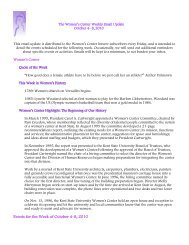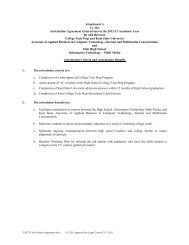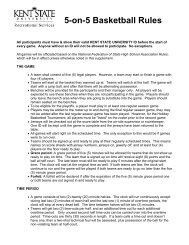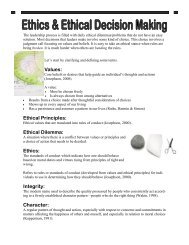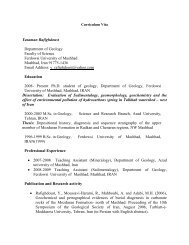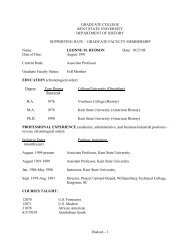Lester Lefton Lester Lefton - Kent State University
Lester Lefton Lester Lefton - Kent State University
Lester Lefton Lester Lefton - Kent State University
Create successful ePaper yourself
Turn your PDF publications into a flip-book with our unique Google optimized e-Paper software.
Resetting the<br />
Body’s<br />
Clock<br />
Professor’s research leads to<br />
healthful strategies<br />
By Lisa Lambert, M.A. ’05<br />
Dr. David Glass conducts pioneering research on the body’s biological clock.<br />
Photograph by B o b C h r i s t y, ‘ 9 5<br />
Everyone is equipped with a biological<br />
clock, a region in the brain the<br />
size of a corn kernel, which dictates our<br />
sleep-wake cycles. Those cycles, known<br />
as circadian rhythms, play a major role<br />
in our physical and mental health.<br />
Pioneering research conducted by<br />
Dr. David Glass, <strong>Kent</strong> <strong>State</strong> professor<br />
of biological sciences, has shown the<br />
body’s clock can be reset — and that’s<br />
good news for people who work swing<br />
shifts, experience jet lag or take antidepressants.<br />
Glass, who is known internationally<br />
as the first researcher to measure serotonin<br />
release from the brain’s biological<br />
clock region, has traded in his former<br />
territory for a new frontier in circadian<br />
rhythm research.<br />
“We’ve come to the point where<br />
we’ve answered the questions about the<br />
role of serotonin in the body’s clock,”<br />
Glass says. “Now we’re looking at a particular<br />
neuropeptide that plays a major<br />
role in synchronizing the body’s clock<br />
and mediating behavior.”<br />
Glass has become the first to extract,<br />
identify and measure the neuropeptide,<br />
known as NPY; in fact, he is the first to<br />
study the release of any neuropeptide<br />
important to the control center of the<br />
body’s clock in freely acting animals.<br />
Disruptions to the body’s clock<br />
are more than minor inconveniences;<br />
they can pose serious health risks. For<br />
instance, Glass says studies have shown<br />
people working swing shifts have shortened<br />
life spans, with higher rates of<br />
alcoholism, heart disease and psychiatric<br />
problems than the general populace.<br />
“Our overall focus is to develop ways<br />
to use NPY to manipulate the body’s<br />
clock and help alleviate problems that<br />
arise from our lifestyles,” Glass says.<br />
Learn more about Glass’s research<br />
and adjusting to time changes at www.<br />
kent.edu/magazine.<br />
What’s a neuropeptide?<br />
Neuropeptides, a member<br />
of a class of protein-like<br />
molecules made in the<br />
brain, consist of short<br />
chains of amino acids<br />
— some that function<br />
as neurotransmitters and<br />
some as hormones.<br />
p a g e10<br />
6<br />
2





